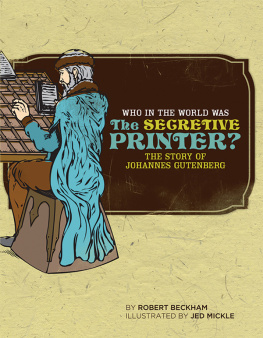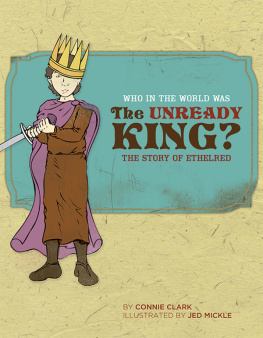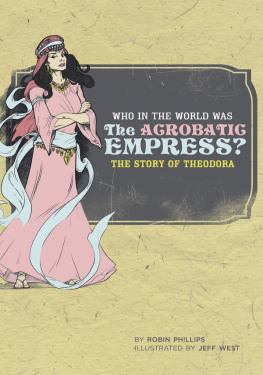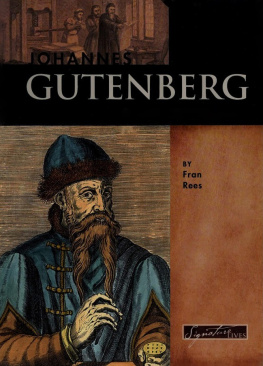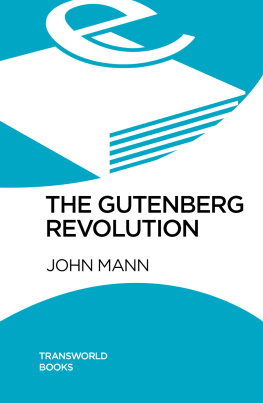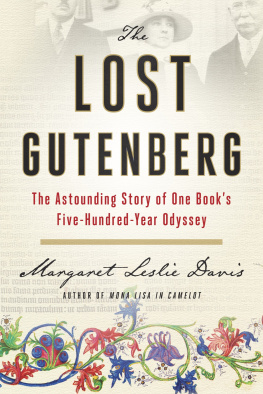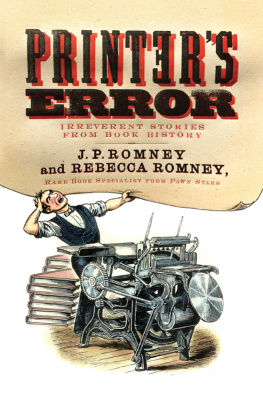Robert Beckham - Who in the World Was the Secretive Printer?: The Story of Johannes Gutenberg (Who in the World)
Here you can read online Robert Beckham - Who in the World Was the Secretive Printer?: The Story of Johannes Gutenberg (Who in the World) full text of the book (entire story) in english for free. Download pdf and epub, get meaning, cover and reviews about this ebook. year: 2005, publisher: The Well-Trained Mind Press, genre: Detective and thriller. Description of the work, (preface) as well as reviews are available. Best literature library LitArk.com created for fans of good reading and offers a wide selection of genres:
Romance novel
Science fiction
Adventure
Detective
Science
History
Home and family
Prose
Art
Politics
Computer
Non-fiction
Religion
Business
Children
Humor
Choose a favorite category and find really read worthwhile books. Enjoy immersion in the world of imagination, feel the emotions of the characters or learn something new for yourself, make an fascinating discovery.
- Book:Who in the World Was the Secretive Printer?: The Story of Johannes Gutenberg (Who in the World)
- Author:
- Publisher:The Well-Trained Mind Press
- Genre:
- Year:2005
- Rating:3 / 5
- Favourites:Add to favourites
- Your mark:
Who in the World Was the Secretive Printer?: The Story of Johannes Gutenberg (Who in the World): summary, description and annotation
We offer to read an annotation, description, summary or preface (depends on what the author of the book "Who in the World Was the Secretive Printer?: The Story of Johannes Gutenberg (Who in the World)" wrote himself). If you haven't found the necessary information about the book — write in the comments, we will try to find it.
Discover the intriguing story of Johannes Gutenberg in this junior-level biography from Peace Hill Press.
Johannes Gutenberg spent his days shut away, working on a mysterious project. His neighbors wondered what he was doing in his metal shop. Why did he need so much money? Was he making expensive gold jewelry? Weapons? Armor? What project could possibly take up so many hours of Johanness time? And how did his invention change the world?Outstanding illustrations from Jed Mickle complement the fabulous story, giving second-grade readers insight into the life of this influential figure.
About the series: The classical curriculum introduces even the youngest student to the pleasures of true learning. Elementary students learn history not through predigested textbooks with multiple-choice answers, but through reading the stories of history. Unfortunately, biographies of great men and women of the past are almost all written for older students, limiting the ability of young students to explore history through reading. Libraries are crammed with biographies written for high school students and adultswhile beginning readers are provided with a shelf full of junior-level books about football players, NASCAR drivers, and movie stars.
Now, Peace Hill Press puts real history back into the grasp of the youngest historians with the Who in the World Biography Series. The first entries in the series provide young readers and their parents and teachers with biographies of great men and women of the Middle Ages. Designed to be used as part of The Story of the World curriculum, these biographies give beginning historians in grades 24 a chance to explore beyond the textbook. An audio version is also available separately.
Robert Beckham: author's other books
Who wrote Who in the World Was the Secretive Printer?: The Story of Johannes Gutenberg (Who in the World)? Find out the surname, the name of the author of the book and a list of all author's works by series.

